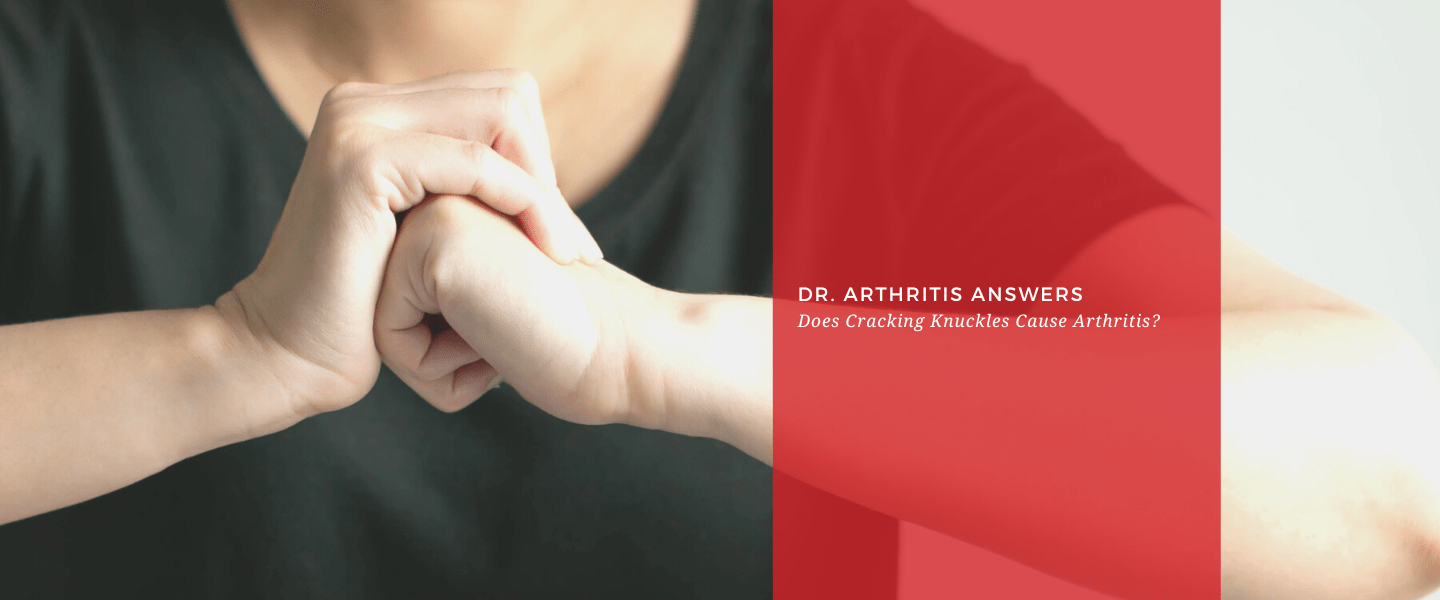With over 1 million orders

Does Cracking Knuckles Cause Arthritis? --Dr. Arthritis Answers
In this article, Dr. Arthritis addresses the long-standing myth that cracking your knuckles can lead to arthritis. Spoiler alert: there's no scientific evidence to support this claim. Read on to explore what actually happens when you crack your knuckles and why it's generally not a cause for concern.
Is that satisfying snap of a freshly cracked knuckle a ticking time bomb for arthritis? It's a question that's as common as the habit itself. If you've ever wondered whether you're jeopardizing your future joint health, you're not alone. Dr. Arthritis is here to answer the question: does cracking knuckles cause arthritis and get to the bottom of this once and for all.

Where Did This Idea Even Come From?
The idea that cracking your knuckles will lead to arthritis is like one of those playground rumors that just won't die. "Hey, don't jump off the swing, you'll break your arm!" or "Don't swallow gum; it'll stay in your stomach for seven years!" We've all heard them.
But when it comes to knuckle-cracking, the warnings often come from a place of genuine concern, maybe even from your own family. You could say it's the sort of "folk wisdom" that gets passed down from generation to generation. But here's the kicker: where's the evidence?
If we're talking hard science, it turns out there's not much to stand on. A handful of studies have been done, and most of them give the knuckle-crackers of the world a pretty clean bill of health, at least when it comes to arthritis. So, why does the myth persist? Maybe because arthritis is a real problem—millions of people suffer from it—and it's human nature to try and find simple explanations for complex issues. But sometimes, those simple explanations turn out to be more fiction than fact.
What Happens When You Crack Your Knuckles?

That satisfying "pop" when you crack a knuckle isn't the sound of your joint structures breaking or tearing; let's clear that up right now.
What's actually happening is pretty interesting from a scientific standpoint, even if it might make you wince just thinking about it.
Your joints are places where two bones meet. They're lubricated with a substance called synovial fluid. This fluid contains dissolved gases—oxygen, nitrogen, and carbon dioxide. When you stretch or bend your joint to crack it, you increase the joint's volume, which decreases the pressure in the joint.
What does this mean for your joints? The decreased pressure allows the gases in the synovial fluid to come out of the solution, forming a bubble. When the bubble bursts—pop! That's the sound you hear when you crack your knuckles.
Now, bursting a bubble in your joint might sound like a bad idea, something that would cause wear and tear over time. But according to most scientific studies knuckle-cracking doesn't cause arthritis, nor does it seem to cause any significant damage to the joints.
In other words, that bubble bursting is a lot less scary than it sounds.
Still, it's worth mentioning that if cracking your knuckles—or any other joint—causes pain, that's a sign to consult a medical professional. Because while the act itself is mostly harmless, pain could be a symptom of an underlying issue and it would be smart to get that checked out.
So, Does It Cause Arthritis?
You've probably been waiting for this part: the definitive answer. Does cracking your knuckles actually cause arthritis? Well, after sifting through piles of scientific research and expert opinions, the consensus is pretty clear: no, it doesn't.
It's not like researchers haven't tried to find a link. Over the years, multiple studies have put this age-old question to the test. They've compared people who crack their knuckles regularly to those who don't, looking at long-term outcomes and the health of their joints. Despite their efforts, they've mostly come up with nothing—no significant evidence to suggest that your popping and cracking will lead to arthritis down the road.
Most medical experts today view the claim as a myth, one that has been debunked through empirical study. If knuckle-cracking were indeed a fast track to arthritis, we'd have seen some solid proof by now given how common the habit is. But the data just doesn't support it.
That said, absence of evidence isn't evidence of absence. Just because we haven't found a link yet doesn't mean one absolutely doesn't exist—it's just highly unlikely based on what we know now. So, for the time being, you can probably crack away without too much worry about your future joint health. But again, and this can't be stressed enough, if you're experiencing pain when you crack, that's a signal to consult with a healthcare provider.
For additional information on the relationship between cracking your knuckles or back and arthritis, take a look at our other relevant articles below:
Does Popping Your Fingers Cause Arthritis? When Finger-Popping May Signal More
Does Cracking Your Back Cause Arthritis? We Get To The Bottom of This Age Old Question
Can You Get Arthritis from Cracking Your Neck? --And Other Common Arthritis Myths
